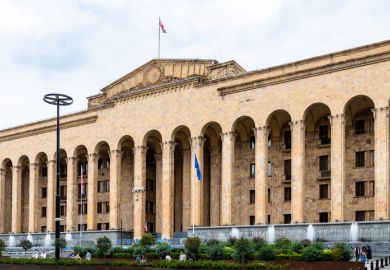In book five of his Ethics , at the opening of his discussion of justice, Aristotle notes a particular form of argument that consists of defining terms only by what they are not: justice, he says accordingly, is merely the opposite of injustice. More often than not, discussions of censorship take this form. Censorship is defined, its degrees measured, by reference to its opposite - what we call free expression - and its history recorded in terms of its negative capability: its failures rather than its successes. Complete success would leave us with a blank page; an absence in history.
This is clearly a nonsense, as the bulky Censorship: A World Encyclopaedia makes abundantly evident. One of the paradoxes of censorship is that in attempting to render the dark underworld of its workings invisible, it makes itself - and the objects of its assault - highly conspicuous. Socrates, for instance, was subjected to the ultimate form of censorship - death at the hands of the Athenian state - for "corrupting" the youth of the city, but his ideas and methods live on. Solzhenitsyn was posted to the gulag, expelled from the Soviet Writers' Union and his work suppressed by Glavlit, the Soviet board of censorship, but his denunciation of the system survives in some of the greatest literature of the 20th century.
Censorship can even have the benign effect of acting as an unparalleled publicist for works that might otherwise have passed unnoticed. Quentin Tarantino, in the course of his much-publicised battles with the British Board of Film Classification - formerly Censorship - over his film Reservoir Dogs , famously pronounced: "It's great to be banned!" And Censorship amply documents that history has its revenge. It records George Gooch's comment that "luckily for historians, attempts to mislead posterity rarely succeed, however long we have to wait for the truth".
What an approach focused exclusively on specific works or authors fails to do is take account of the might-have-beens: the countless works of art and literature that did not happen or that were prevented from seeing the light of day. We know what Shostakovich composed and the troubles he had throughout his life with the highest authorities of the all-censoring Soviet state; what we do not know is what more he - and many more like him in the conservatoires of the Soviet Union - might have done.
As the editor of Censorship is at pains to point out in his excellent introduction, censorship is more than the sum of its acts. It is a process that permeates a society from top to bottom. The climate of fear and negation it engenders is inculcated by an assiduous bureaucracy, the sole purpose of which is to render invisible or reduce to silence anything contrary to the received wisdom emanating from those in power. Its consequences can be ludicrous as well as tragic. For example, Doris Lessing relates the story of a man executed in the reign of the late shah of Iran for calling his cat Shah-in-Shah. "It is safe to assume that the Shah, while a petulant tyrant, could not have approved of the unfortunate being executed for calling a cat a king," she writes, "but then he would not have known of it." But then he - or Stalin, or the rulers of apartheid South Africa, or the military juntas of Latin America - would have no need to know if the "system" was operating as intended.
As the popular imagination would often have it, and as the many country entries in Censorship evidence, censorship as we have come to know it did not reach its apogee with the creation of the Soviet Union. Censorship is as old as civilisation itself; there never was a censor-less golden age. While Socrates was downing his hemlock in democratic Athens, an imperial tyrant in far-off China was busy rewriting the past by burning the works of Confucius and anything else that indicated the existence of an empire that pre-dated this particular son of heaven.
The urge to censor appears to be an innate faculty of government regardless of political complexion, and universal in its practice. Our present culture of free expression - the right not to be censored - is a relative and still vulnerable parvenu. It has cost lives and liberty to secure it as a right enshrined in international law; its preservation and protection continue to demand vigilance.
In Britain, it was Milton who most famously inveighed against religious censorship: "Though all the winds of doctrine were let loose to play upon the earth, so Truth be in the field, we do injuriously by licensing and prohibiting to misdoubt her strength" ( Areopagitica , 1644). Two centuries later, when the battle for a free press had been largely won, John Stuart Mill went further and invoked free speech as a principle: "If all mankind minus one were of one opinion and only one person were of the contrary opinion, mankind would be no more justified in silencing that person than he, if he had the power, would be justified in silencing mankind" ( On Liberty , 1859). By then, of course, Voltaire had pronounced his famous maxim: "I dislike what you say but I will defend to the death your right to say it." While this was quickly taken up as the mantra of all those gripped by the revolutionary fervour of the day, it took the newly independent US to enshrine the principle in law in the form of the First Amendment to the Constitution in 1791: "Congress shall make no law... abridging the freedom of speech or of the press." This remains the gold standard to which the rest of the world can still only aspire.
Notwithstanding Article 19 of the Universal Declaration of Human Rights, Censorship reveals that other governments have not yet shown themselves ready for this level of absolutism. Even the recent European Convention on Human Rights keeps a careful balance between the right to free expression and access to information, and the right to personal privacy, and the demands of states and corporations for secrecy where matters of state security or corporate research are involved.
Contrary to certain expectations at the time, the demise of the Soviet Union did not mark the end of censorship. The governments of the newly liberated countries of eastern Europe showed no desire fully to embrace their long-awaited freedoms. In the Balkans, as in Rwanda, a supposedly "free" media played a key role in invoking the hate that fomented war and genocide and in silencing opposition. Worldwide, virulent nationalism, genocidal ethnocentrism and religious fundamentalism in all its varieties moved in to fill the vacuum left by the old enemy. A new map of censorship emerged: the geography and the ideology had shifted, but the instinct to silence was as strong as ever.
The challenge came not only from out there, from "freedom's oldest enemies", but, as the US jurist Ronald Dworkin points out, from "new enemies who claimed to speak for justice not tyranny" who "point to values we respect such as self determination, equality and freedom from racial hatred and prejudice as reasons why the right of free speech should be curtailed". From the closing decade of the past century, cultural relativism and political correctness collectively have exerted a tyranny over free expression that, at its most extreme, has become, particularly though not exclusively in the US, a new kind of censorship. The "speech codes" that have appeared on university campuses across the US illustrate absurdities to which this well-meaning but ill-informed censorship can lead.
The encyclopedia supplements entries on specific acts of censorship against a particular work or person with detailed country surveys, written by experts in the field and packing a wealth of information lucidly into a minimum of space. That on China, for instance, covers the period from the 6th century BC to the more or less present. There are equally erudite and fascinating country entries for every member of the United Nations, many of them evidently involving painstaking research in countries seldom exposed to such scrutiny.
Under topics as varied as "film and video" - an excellent one of its kind, cramming much information on the ongoing history of censorship in this field authoritatively into limited space - law and human rights, religion, sex and violence, as well as the more obvious press, performing arts and books, information scattered elsewhere throughout the book is brought together. Further reading suggestions at the end of every entry make this a veritable censorship library.
If there is a quibble, it does not seriously detract from what is a unique publication. While each volume has excellent head lists of alphabetical entries as well as entries under countries and topics, and volume four includes a useful though not altogether comprehensive index, more cross-referencing within the text would make the task of tracking down a particular subject in detail far less laborious. It would be helpful to know, for example, that the main entry on "book burning", which covers only medieval Europe, is supplemented by copious information on this universal practice elsewhere in the encyclopedia's pages.
With substantial entries on the new varieties of censorship that are making their appearance in this global age - the concentration of media ownership that threatens democratic plurality, the creeping loss of access in the mainstream for minority and dissident views, the "dumbing down" of the media generally as news gives way to "infotainment", the consensual use of the language of prejudice and discrimination that subtly determines attitudes and opinions and more - Censorship is as up-to-date as any compendium of the kind can be.
But the world does not stop with publication, and September 11 has brought us to another watershed in the long history of censorship. Amnesty International's latest annual report, published at the end of May, notes with alarm that rights and liberties - including the right to free expression in the US media and in its universities - are being sacrificed to a new urge to censor, this time in the name of global security and the "war on terrorism". And this in the land of the First Amendment. Little wonder that old offenders such as Russia and Turkey are taking the opportunity to muzzle their own media, citing the US as their model.
Judith Vidal-Hall is editor, Index on Censorship .
Censorship: A World Encyclopaedia
Editor - Derek Jones
ISBN - 1 57958 135 8
Publisher - Fitzroy Dearborn
Price - £295.00 (four volumes)
Pages - 2,891
Register to continue
Why register?
- Registration is free and only takes a moment
- Once registered, you can read 3 articles a month
- Sign up for our newsletter
Subscribe
Or subscribe for unlimited access to:
- Unlimited access to news, views, insights & reviews
- Digital editions
- Digital access to THE’s university and college rankings analysis
Already registered or a current subscriber?



